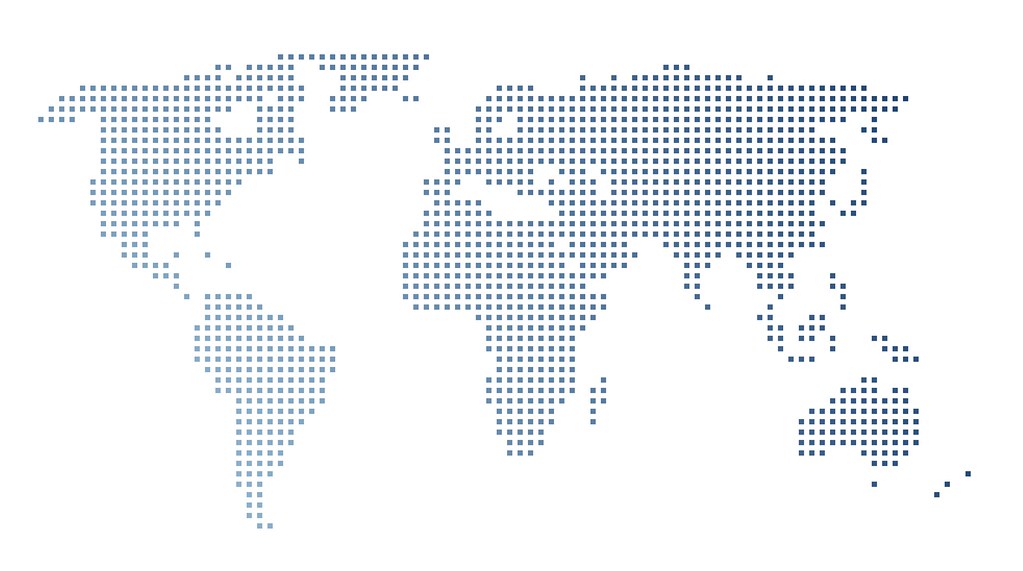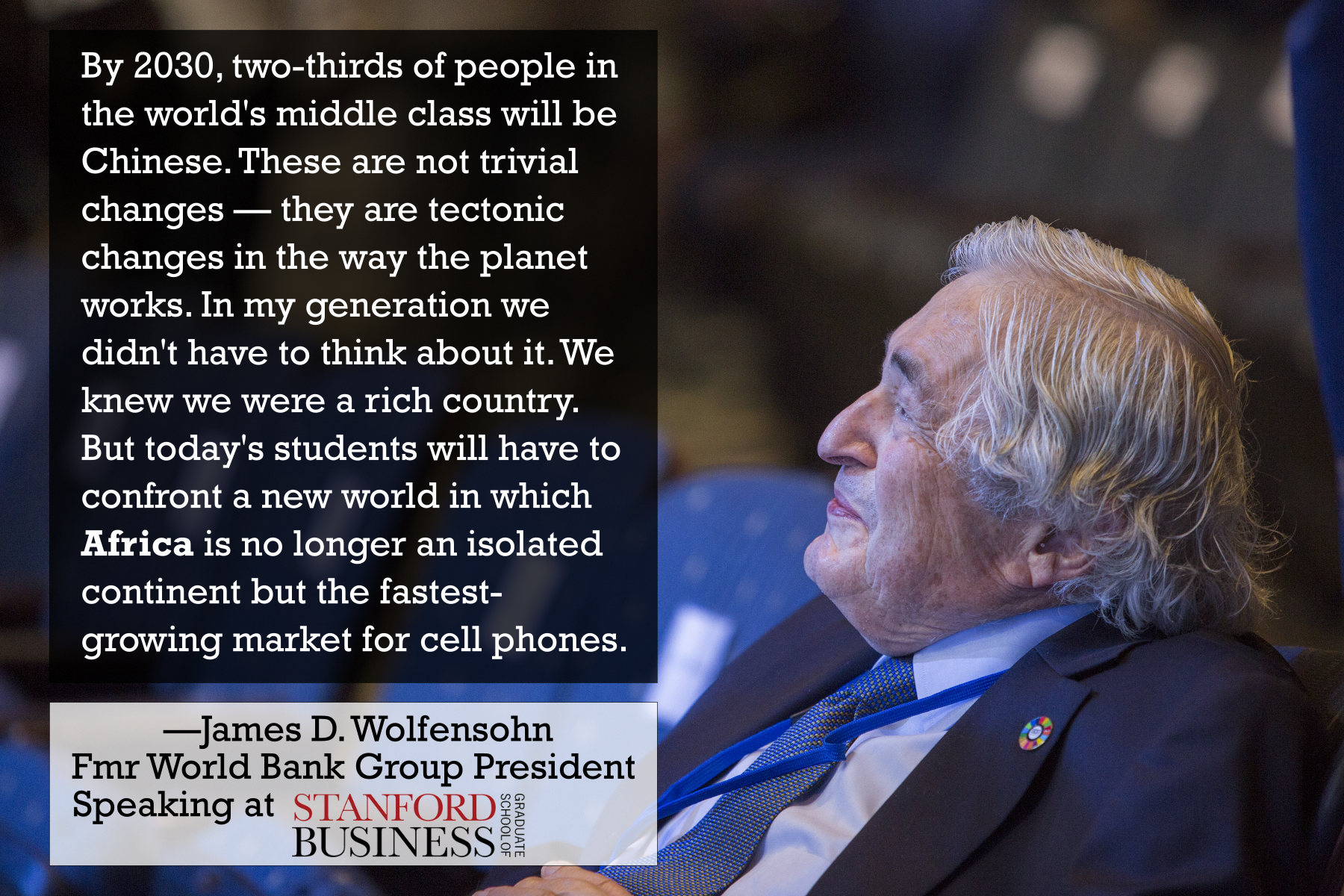
At a Stanford Graduate School of Business guest lecture, James Wolfensohn, former president of the World Bank tells of an incident he witnessed at a G-8 meeting. It was the first time leaders from the developing world had been invited and Hu Jintao from China was the first to speak followed by the Prime Minister from India and then came President Lula from Brazil who charmingly made the following ‘paraphrased’ remark to his colleagues from the developed world during his speech, “…I’d like you to consider something, maybe next year, you should have your meeting in Brazil. And the reason why is because you should start getting used to the fact that, in another ten to twelve years, five of you are not going to be here. And you will be replaced by my friend from China and my friend from India and by myself. And we’d like you to get used to it, so that you can come see us”(Wolfensohn, 2010).
Not too long after this meeting the global financial crises hit and what would have once upon a time been a G-8 issue became a G-20 issue. At the 2012 G-20 summits, one of the items on the agenda was the Eurozone. The IMF plans to help Europe with a $430 billion fund to be used as a firewall to support the struggling EUROZONE economies. At the summit China pledged to give $43 billion towards this fund. Brazil, Russia and Mexico pledged $10 billion each. Turkey pledged $5 billion and other emerging economies pledged smaller sums. Who would have thought such a day would have ever come when Europe would be supported by nations not yet recognized as “developed”?
Indeed the world is undergoing a vertical and horizontal metamorphosis of sorts where power is migrating vertically beyond the periphery of states and at the same time migrating horizontally, broadly speaking, away from nations gathered around the Atlantic seaboard to the nations gathered around the Pacific Rim (Ashdown, 2011). The share of global economic activity of developed nations declined from 80% in the period between 1960-1972 to 57% in 2008-2009, a 23% point drop whereas that of developing nations located mainly in Asia, Latin America and the Middle East jumped from 17% to 39% (Ahearn, 2011).
As of this writing, the developing world is now accounting for a growing chunk of the World Gross Domestic Product (GDP). It is estimated that in the next 40 years, the economic activity of the developed region will drop to 35% and that of the developing world will move to about 65% (Wolfensohn, 2010). These are projections but should they prove true, this will be the first time in about 200 years when the majority of world economic activity is produced by developing nations. Accompanying these political and economic shifts of power are massive demographic changes. The UN projects that by 2050, the world will have a population of 8.9 billion with majority of the increase in less developed regions. As these regions experience 58% growth over 50 years, the developed regions will grow at 2% over the same period. The former will account for 99% of the expected increment in World population during this period (United Nations Department of Economic and Social Affairs, 2004). At the same time as the economic power may be shifting to the developing nations, these nations will have a larger population for whom to provide food, shelter and security.
From history it is argued that when economic power shifts, it is usually followed by the political (Ashdown, 2011). Hence one wonders what a world with the BRICs or frontier economies in the leadership seat would look like in the realm of global governance. When I refer to economic power in relation to the shift, I mean the economic clout generated primarily through trade and manufacture or share of world GDP.
Unregulated Multinational Corporations (MNCs)
In practical terms, local firms and companies contribute to world GDP through their output but the major players are the multinational corporations (MNCs). To buttress this point, here are some figures. America contributed more than a fifth i.e. 24% of world economic activity in 2008-2009 (Ahearn, 2011), the majority of which came from its MNCs (Cummings, et al., 2010). American MNCs, excluding their foreign affiliates amount to 2,270 companies i.e. less than one percent of all companies in the USA, yet they employed two-thirds of the workforce and accounted for 90% of the share of intermediate inputs purchased from other US based firms (Cummings, et al., 2010). There is no doubt that their MNCs are major contributors to their world economic activity. The USA MNCs parents contributed 73% of the R&D performed by all businesses in the USA. The manufacturing R&D activities of the MNCs accounted for 79 percent of all R&D expenditures (Yorgason, 2007). The interesting fact about MNCs worldwide is that they operate in a global space that is largely unregulated.
The multinational corporations now developing budgets often bigger than medium-sized countries — these live in a global space which is largely unregulated, not subject to the rule of law, and in which people may act free of constraint.”—Paddy Ashdown (Ashdown, 2011)
This is not a phenomenon exclusive to just MNCs. The entire Global space is replete with private entities that act outside government channels with a mission of “addressing” global problems. Some of these organizations have regulatory characteristics like the Internet Corporation for Assigned Names and Numbers (ICANN) or the private entities behind the creation of the new Lex Mercatoria. These organizations are mostly unregulated and private, yet they wield a lot of clout in global happenings.
Such powerful entities benefit from the unregulated nature of the space within which they operate because it enables them to function to a large extent free of constraint. Yet such a situation is not without cost to the wider global society. Unregulated global space plays host to both ‘good’ forces e.g. some of the actors involved in manufacture and trade and negative forces such as those responsible for transnational criminality and transnational terrorism. The lack of restraint that enables international merchants to roam free also enables terrorists to work freely in the global space. In a way, it’s a double-edged sword. Unregulated space can be taken advantage of by whosoever will and have the resources to make that will a reality.
Consequently, there is no question that governance needs to be brought to the global space but what form should it take? I do not know. Many suggestions have been proffered. One of such suggestions is the legalization of the global space i.e. to use law-like processes to regulate portions of the global space. Substituting the GATT with the WTO is cited as an example of such legalization of part of the global space where a legal regime with binding rules and a court-like system for authoritative interpretation of the rules have been used to replace a diplomatic approach (Trubek & Cottrell, 2009). It has also been said that bringing “the powerful” together to form treaty-based systems, agreements and organizations such as the WTO, Kyoto and G-20 stand a better chance of bringing governance to the global space as compared to the United Nations framework which is more of a discussion forum for the legitimization of international action but not a forum for taking executive action (Ashdown, 2011).
I foresee a few challenges with legalization. To start with, when the powerful e.g. the developed nations and the BRIC are brought together to form these treaty based systems, agreements and organizations, what happens with the voice of the weak who form majority of the citizenship of the world? How do they get their interests represented? Secondarily, legalizing segments of the global space such as replacing GATT with WTO does not holistically solve the problem. The way MNCs govern their operations at present is a perfect example.
With the help of actors like firms, lawyers, international arbitrators and legal academics, MNCs have created their own private system of transnational governance called the new Lex Mercatoria. This system is designed to organize and regulate cross-border commercial exchange usually with more autonomy for the MNCs than the states in which they work. States have to adapt their legal systems to this private regulatory system, which is in many respects independent from external regulation and has its own ‘a-national’
law of contract and a system of private ‘courts’ (Sweet, 2006). The Lex Mercatoria is “parasitic on state authority in that it
uses state authority where necessary, essentially for enforcement purposes, while
otherwise working to reduce the reach of sovereign control over transnational
business” (Sweet, 2006).
WTO may help to an extent but it is not a perfect solution to the complexity of issues which accompany regulating a global space undergoing shifts of power.
Probable Attributes of a new Global Gov System
The global space like any other space when left fallow will host both desirable and undesirable elements. It is my contention that steps should be taken to provide legitimate order in the global space. Such an undertaking could take years to accomplish simply because it must take into consideration the views of the entire peoples of the earth—either through the avenue of states, global civil societies or some other nifty technological mechanism. The creation of such a system should guard against the weaknesses and failures of the past where only “the powerful” are consulted when taking collective decisions that affected the shared destinies of all peoples. It is basic to humanity and states to act in self-interest. Nevertheless, at some point, we should humble ourselves and learn from history. Those who refuse to learn from history are doomed to repeat it. Below are a few principles such a new global governance system may include.
Democratic
The process of bringing governance to the global space must be as much as possible democratic—not taking into account just transnational entities or powerful nations such as the developed ones and the BRIC but all nations. To ignore giving all peoples the right to participate in this endeavor, in my opinion, would be to program failure into the nucleus of the new system right from its genesis.
Legitimacy
Giving all peoples of the world the right to participate can be a tool to legitimize the governance system and processes. This right once given will also serve as a strong incentive or ‘soft’ regulatory device for ensuring compliance with whatever the new global governance system sets forth. Exclusion of today’s weak and poor who may be tomorrow’s powerful is not wise partly because exclusion could be used by enemies of a united global regulatory system as an accusatory device—an argument to discredit the system. Giving people the right to participate is giving them a sense of ownership for the system. In the absence of the right of participation, not only will there be a legitimacy gap but what happens the next time there is reconfiguration of power in the global space? If the system is inclusive of all peoples, it will probably stand the test of time even in the face of future reconfigurations in constellations of power or changes in demographics.
Equality
Finally it would be helpful for the system to include equality of all peoples as a core feature. Equality is the only foundation in my opinion upon which true multilateral executive courses of action can be taken to the satisfaction of most peoples. The world belongs to all of us and if we do not start acting like it in a spirit of brotherhood and cooperation [rich and poor alike], we will not be able to handle the challenges that are ahead.
Graduated Approach
A challenge to be encountered in regulating the global space is the diversity of interests of states, MNCs and other actors represented in the global space. But in many ways, the diversity can also be a source of strength for creativity and innovation. In any case, a unity of diversity is the principle underlying our university systems. It’s time for humanity to learn to find unity in the midst of its diversity. It does not help to look at diversity solely as a source of prolonged discussions and inaction.
As has been alluded to, some believe legalization is the way forward. By itself, it probably is not. A governance system for the global space will probably be far more complex than just a legalization of certain sectors. Legalization can form a part of a more holistic system which mirrors what Robert Hudec suggested over 40 years ago, “a flexible legal process that tracks well with the emphasis on standards, soft law, and multilevel deliberation” (Trubek & Cottrell, 2009). This holistic system should also strive where feasible and practicable to incorporate the other useful alternative forms of governance that already exist in the global space. There is no need to discard traditional systems that already work well just in the name of modernity.
Works Cited
Ahearn, R. J. (2011). Rising Economic Powers and the Global Economy: Trends and Issues for Congress. CRS Report for Congress, Congressional Research Service.
Ashdown, P. (2011). The global power shift. Brussels: TEDxBrussels. Retrieved 2 24, 2012, from http://www.ted.com/talks/lang/en/paddy_ashdown_the_global_power_shift.html
Cummings, J., Manyika, J., Mendonca, L., Greenberg, E., Aronowitz, S., Chopra, R., . . . Watson, A. (2010). Growth and competitiveness in the United States: The role of its multinational companies. McKinsey Global Institute. McKinsey & Company.
Davies, J. B., Sandström, S., Shorrocks, A. B., & Wolff, E. N. (2009). The Level and Distribution of Global Household Wealth. Working Paper 15508, National Bureau of Economic Research, Cambridge. Retrieved from http://www.nber.org/papers/w15508
Mujih, E. (2008, March). The Regulation of Multinational Companies Operating In Developing Countries: A Case Study of the Chad–Cameroon Pipeline Project. African Journal of International and Comparative Law, 16, 83-99. doi:10.3366/E0954889008000078
Sweet, A. S. (2006, August). The new Lex Mercatoria and Transnational Governance. Journal of European Public Policy, 627–646. doi:10.1080=13501760600808311
Trubek, D. M., & Cottrell, P. (2009). Robert Hudec and the Theory of International Economic Law. In C. Thomas, & J. P. Trachtman, Developing Countries in the WTO Legal System. Oxford University Press.
United Nations Department of Economic and Social Affairs. (2004). World Population to 2300. United Nations Publication, United Nations, Population Division.
Wolfensohn, J. (2010). Balance of Power Shift Coming. Stanford: Stanford Graduate School of Business. Retrieved 2 24, 2012, from http://www.youtube.com/watch?v=6a0zhc1y_Ns
Yorgason, D. R. (2007). Research and Development Activities of U.S.Multinational Companies. U.S. Bureau of Economic Analysis. BEA.







